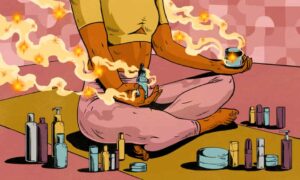
Hi Ugly,
I’ve been obsessed with makeup and beauty products for years and have read a lot (and seen a lot of TikToks) about how a beauty routine can be a form of meditation or mindfulness. I felt that way for a really long time.
Lately, I’m realizing that even when I do my relaxing eight-step skincare ritual every night and have my little mental health morning setup with makeup and coffee – “girl therapy” – I do not feel relaxed or mentally well most of the time. (Not in a “seek treatment” way, but in a general malaise way.) Am I doing it wrong? Do you think makeup can ever be a therapeutic practice or mindfulness tool?
Girl Therapy Isn’t Working
The line between the beauty and wellness industries has blurred to the point of nonexistence. It is from this place of nothingness that we get the concept of “makeup as meditation”. Maybe it’s the beauty industry’s attempt to monetize mindfulness, or maybe it’s the industry’s attempt to sabotage mindfulness, lest customers rise above beauty culture brainwashing.
Whatever the origin, it’s everywhere now. See: How to turn your beauty routine into a meditation session, How applying makeup can serve as a built-in form of daily meditation, or “Makeupfulness” is where makeup and mindfulness merge.
Makeupfulness. MAKEUPFULNESS? It does not surprise me that this is not working for you, Girl Therapy.
For one, meditation is the search for the unconditioned self, and beauty products are often, in modern contexts, tools of the conditioned self. When you “meditate” by looking in the mirror, hyperfocusing on your hyperpigmentation and covering it up with concealer, you’re essentially acting out your social conditioning – and methodically internalizing beauty standards.
I’m also not convinced that “meditation” through makeup nets any stress relief. The idea that the slow, deliberate application of blush and contour paired with deep breathing relaxes the nervous system seems plausible at first; some forms of meditation do center the sensation of touch.
However, the point of such methods is to feel into the body as it is, not alter the body to appear as it is not. And while “pleasant touch” (hugging, holding hands) has been shown to soothe the nervous system, other forms of touch may have the opposite effect. In The Body’s Edge, the medical ethicist Dr Marc Lappé points out that traditional meditation methods tend to encourage stillness, as “excessive cutaneous [skin] stimulation can be the bane of healthy psychic functioning”.
My personal takeaway from all that? The physical stimulation of so-called “makeup as meditation” most likely negates the benefits of traditional meditation – a practice that’s supposed to center your spirit, not even your skin tone.
I don’t mean to be an absolutist here. Sometimes makeup is a pure, divine, artistic expression of the self, and that’s beautiful. It is not meditation, though, and I think equating the two devalues the spiritual practice of meditation.
